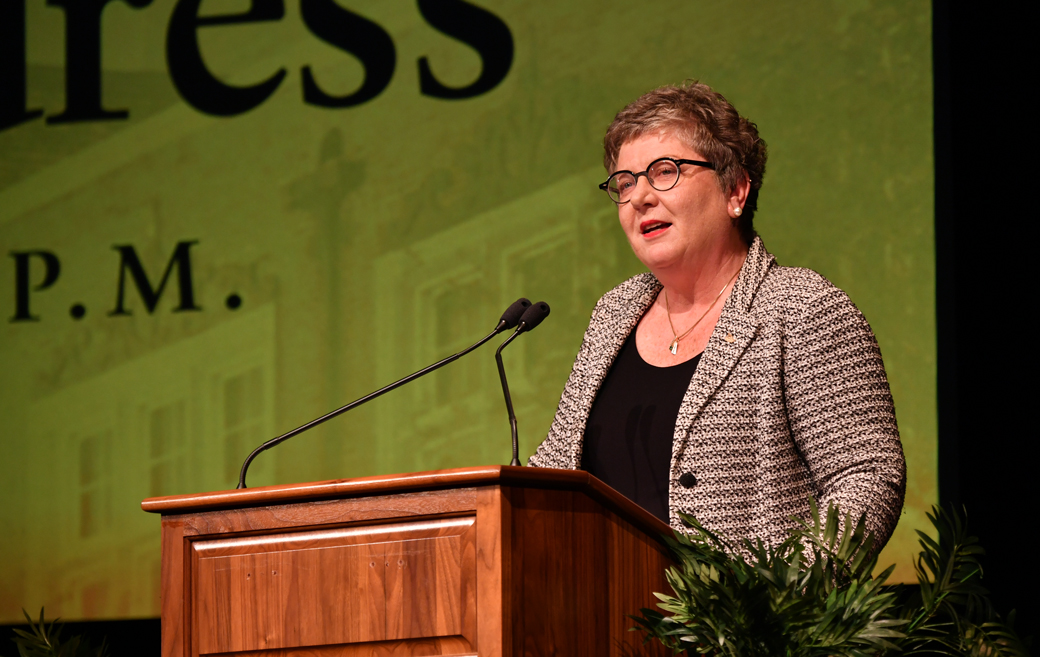President Kim Schatzel delivers her 2016 Fall Address
In her annual message to the TU community, Schatzel focused on her presidential priorities and the future of the university.

Two words best characterized President Kim Schatzel’s Fall Address Thursday afternoon in the historic Stephens Hall Theater: presidential priorities[BROKEN LINK]. In a 27-minute address to more than 250 attendees and hundreds more watching on social media, Towson University’s 14th president provided a clear, concise progress report on all of the work currently being done in her eight major areas of focus.
Schatzel also talked proudly about several recent TU “Points of Pride,” including the most diverse incoming group of freshmen in the university’s history, and briefly mentioned a new partnership agreement signed Wednesday that commits the university to work with a delegation of Iraqi Parliamentarians who are engaged in higher education reform in Iraq.
“Not only is the class of 2020 one of our most academically prepared classes,” Schatzel noted, “it is also the most diverse class in Towson University’s 150-year history. Forty percent of this year’s freshman class are students of color -- a seventy-five percent increase since the fall of 2011.
“We also welcomed over 2,100 transfers to TU,” she continued, “our second largest transfer class ever! You’ll hear ‘ever’ a lot today. With over 2700 students enrolled, this year’s freshman class is the largest class in eight years here at TU and the second largest in the university’s history.”
Schatzel also recognized five distinguished guests, three of whom are members of Iraq's parliament and its Committee on Higher Education, who were here to establish a collaboration between TU and the Iraqi government on reforming curriculum and capacity-building efforts at Iraqi higher education institutions and in its government. This new collaboration is focused on education and information technology.
But the majority of the president’s address centered on her eight key priorities, beginning with “TU Matters to Maryland,” which she described as the retelling of the “contemporary” TU story.
“The first step in this retelling is for us to perform an identity audit, and it is underway now,” Schatzel said. “The identity audit will include extensive research and focus groups with alumni, members of our campus, legislators, and community and business partners to help us understand what these groups find distinctive and valuable about TU, now and into the future.
“These findings will help form a comprehensive strategic communications strategy that will ensure the contemporary 2016 story of TU is told and retold in a compelling way that influences those key stakeholders,” she added. “This discovery phase work has begun and the audit is scheduled to be completed by late December.”
Schatzel highlighted the efforts now underway as part of two community-focused initiatives: BTU and a recently announced partnership with Margrave Strategies that will better position Towson University as an anchor institution in the Greater Baltimore region.
“For decades and since its founding, TU has been committed to serving our region, making a difference, and transforming lives in Greater Baltimore and across our state,” Schatzel said. “Through BTU we hope to fuel those already existing partnerships to give greater presence, purpose and priority to the work our faculty, staff, and students already do.
“I have asked Ken Ulman, former Howard County Executive and President of Margrave Strategies, to work with us on developing a comprehensive ‘place-making’ strategy,” she explained, “one that focuses on supporting the academic mission of TU, and one that will strengthen our connections to the Towson and Greater Baltimore communities.”
During her address, an enthusiastic Schatzel also touched briefly on her other priorities, including building a culture of philanthropy, establishing a world class career center, developing a world class faculty development center, strategic plan alignment, and the TIGER (transfer, international, graduate enrollment resource) Way initiative.
The New York native was especially passionate when she spoke of her “relentless pursuit of a more diverse and inclusive campus,” a philosophy that is near-and-dear to her heart not only as Towson University president but as a person.
“Indeed real progress has been made in this area,” Schatzel noted. “For example, this past summer two university-wide committees — composed of faculty, staff, and students – overhauled our Hate/Bias reporting process, as well as public safety procedures for large campus events. The results of that work can be found on a ‘microsite’ for everyone’s review.
“Some unacceptable incidents on social media this semester tell us we have much more work to do in this area,” she added.
Schatzel ended her address on a high note, challenging the audience to help build the Towson University of the 21st century.
“During my inaugural address,” Schatzel said, “I spoke about how it is ‘Our Time to Do Great Work for Towson University.’ Our time—faculty, staff, students and alumni of Towson University—to lead and build the Towson University of the 21st century.
“The great work for Towson University’s next 150 years has already begun.”